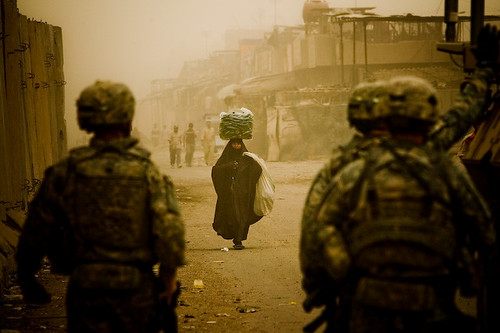
In February 2006 Al Qaeda bombed the al-Askari Mosque in Samarra, Iraq. The attack was Abu Musab al-Zarqawi's crowning achievement, setting off the bloodiest and most grisly phase of the civil war in Iraq. The escalation of the war and the brutal ethnic cleansing campaigns carried out by all sides helped to turn American public opinion decisively against the war and played no small role in the wins of the Democratic party in the November 2006 mid-term elections. While many inside and outside of Washington were finally ready to start looking for an exit, the Bush administration, its legacy already inescapably tied to the war in Iraq, decided to double down. President Bush announced the troop surge on January 10, 2007, and the additional troops began entering Iraq before the end of that month.
Midway through 2007 the levels of violence began to tail off, and by the end of the year attacks and casualties had fallen to their 2004-05 levels. In September 2007 General David Petraeus and Ambassador Ryan Crocker reported to Congress that while virtually none of the political objectives of the surge had been met, the military objectives of the surge were being met. Over the course of 2008, it became conventional wisdom among political talking heads of all stripes that, notwithstanding the failure to achieve the political objectives, the surge had succeeded. John McCain prevailed in the 2008 Republican primaries largely on the basis of having been a champion for the surge. Mainstream newspapers called out Democratic candidate Barack Obama for failing to admit that he had been wrong about the surge. And Obama, for his part, seemed content to support this conventional wisdom on the basis that if the surge had worked, then it must be time to bring the troops home. This conventional wisdom has been augmented by the fact that the decline in casualties and violence has generally taken Iraq off the front pages. For the past year the conflict has been largely out of sight and out of mind, which itself serves as evidence of the apparent success of the surge and also diminishes public discussion that might lead to challenges of the conventional wisdom.
Lately, however, something odd has started to happen. Thoughtful and serious people, with whom I often agree, are employing the apparent success of the surge as justification for a much longer term commitment to keeping troops in Iraq (e.g. Thomas Ricks and Andrew Sullivan). Let me put aside for the moment the fact that I don't believe that the surge was the primary cause for the decrease in violence in Iraq (in fact, it probably wasn't even the secondary cause). Even if we assume that the surge was solely responsible for the decline in violence, the fact that we are today not one iota closer to solving the basic structural political challenges of Iraq than we were three years ago should reveal the surge to all as the utter failure that it is. In truth it stands as a testament to the hollowness and stupidity of the entire endeavor in Iraq from day 1. The question of how to resolve the ethnic/sectarian divisions of Iraq was at the top of every critic's list of objections before the war started in 2003. Here we sit in 2009 and still no one has the first fucking clue how to resolve this problem. And yet Ricks and Sullivan would have us keep tens or hundreds of thousands of troops in Iraq for at least another 5 years in hopes that someone can pull a rabbit out of a hat and make everything better. I hate to be the one to break it to these fellas, it ain't gonna happen.
When I go back and look at what I wrote about Iraq two or three years ago, I see little that has occurred to change my evaluation. It's true that the decline in violence has bought us some time (although the levels of violence have been ticking up again, possibly in reaction to last month's elections). But time for what? There still appears to be little prospect for political reconciliation, meaning that whatever fallout will result from an American withdrawal will happen whether we withdraw this year or in 2015. And our presence in Iraq continues to cost us the lives of our servicemen and an immense amount of money, strain our military capacity and limit our effectiveness in Afghanistan, and hinder our efforts to repair relations with Arab and Muslim nations. The opportunity costs of remaining in Iraq are substantial, and the benefits of staying appear to be minimal. It's time to bring this misadventure to a close.
I remain of the opinion that we should be prepared to intervene again if things spiral too badly out of control, but I do not believe that we will see a serious effort towards political reconciliation until we force the issue by drawing down our forces. We have no better options than to try it and see what happens. The surge has not altered that equation. It has only delayed us, at significant cost, from asking the hard questions and making the hard decisions for the past two years. Now is the time to do what needs to be done.
Photo credit Zoriah

No comments:
Post a Comment